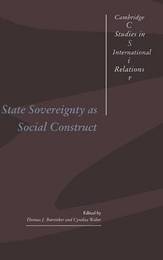
|
State Sovereignty as Social Construct
Hardback
Main Details
| Title |
State Sovereignty as Social Construct
|
| Authors and Contributors |
Edited by Thomas J. Biersteker
|
|
Edited by Cynthia Weber
|
| Series | Cambridge Studies in International Relations |
|---|
| Physical Properties |
| Format:Hardback | | Pages:316 | | Dimensions(mm): Height 229,Width 152 |
|
| ISBN/Barcode |
9780521562522
|
| Classifications | Dewey:320.15 |
|---|
| Audience | | Professional & Vocational | |
|---|
|
Publishing Details |
| Publisher |
Cambridge University Press
|
| Imprint |
Cambridge University Press
|
| Publication Date |
2 May 1996 |
| Publication Country |
United Kingdom
|
Description
State sovereignty is an inherently social construct. The modern state system is not based on some timeless principle of sovereignty, but on the production of a normative conception which links authority, territory, population (society, nation), and recognition in a unique way, and in a particular place (the state). Attempting to realize this ideal entails a great deal of hard work on the part of statespersons, diplomats, and intellectuals. The ideal of state sovereignty is a product of the actions of powerful agents and the resistances to those actions by those located at the margins of power. The unique contribution of this book is to describe, theorize, and illustrate the practices which have socially constructed, reproduced, reconstructed, and deconstructed various sovereign ideals and resistances to them. The contributors analyse how all the components of state sovereignty - not only recognition, but also territory, population, and authority - are socially constructed and combined in specific historical contexts.
Reviews"This useful collection poses an important intellectual challenge to the dominant epistemology...and the central substantive concern...of international politics. The contributors perceptively employ a social constructivist approach to unpack the concept of state sovereignity and reinterpret its several constituent dimensions: recognition, territory, population, authority." S. Mozaffar, Choice
|